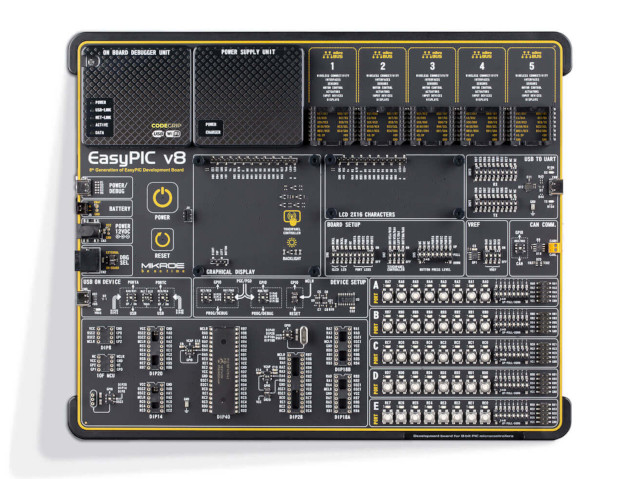
CODEGRIP USB programmer & debugger
Programming & debugging for more than 270 Microchip's popular 8-bit PIC MCUs, from the smallest PIC MCU devices with only 8 pins to powerful 40-pin ones.
CODEGRIP Suite
CODEGRIP Suite as a powerful software suite offers complete control over the EasyPIC v8 development board. It is used to intelligently manage programming tasks, as well as various other options and settings of the development board.
Plug&Play: No USB driver needed
Without the need for any additional support, USB debugger enables programming/debugging over generic USB driver.
Choose from the wide range 8-bit MCUs
EasyPIC v8 covering a wide range of 8-bit PIC MCUs, from the smallest PIC MCU devices with only 8 pins, all the way up to 40-pin “giantsâ€. Board comes with PIC18F47K42 and 8MHz Crystal.
Eight different DIP sockets
Ranging from DIP8 up to DIP40, all DIP sockets allows exclusively placement of MCUs, from the smallest to the largest one. Only a single MCU can be installed into the development board at a time.
Improved quality and design
Surface mounted technology standard enables a sturdy, compact design with improved quality of the sockets and ergonomic design, which allows comfortable project development.
Two display connectors
The EasyPIC v8 development board is equipped with two display connectors, one is a 1x16pin header used for connecting LCD in 4-bit mode. The second is a single row 20-pin header, which supports monochromatic GLCD with the resolution of 128x64 pixels and EasyTFT Board capable of showing advanced graphical content.
Display graphical or textual content
Two display options allowing even the basic 8-bit PIC MCU devices to utilize them and display graphical or textual content. One of them is the 2x16-character LCD module which requires minimal processing power from the host MCU for its operation. The other option is familiar GLCD based on the KS108 (or compatible) display driver, or if you want to upgrade your application EasyTFT is a perfect choice.
Resistive touch panel
EasyPIC v8 provides the required circuitry, allowing the resistive touch panel to be interfaced with the installed MCU. Resistive touch panel is supported over two separate connectors: one 4-pin flat cable connector (FFC) and one 1x4-pin header.
Improved mikroBUS™ sockets
The EasyPIC v8 offers five improved mikroBUS™ sockets, where you can place any of the 650+ different Click boards™, adding the infinite amount of possibilities with the largest add-on-board selection in the world.
Ready-to-use Click boards™
With more than 650 Click boards™ available, they are the fastest-growing range of add-on-boards in the world, which are standardized by pinout and size.
They enhance rapid development and accelerate time to market. These ready-to-use boards require no additional hardware configuration.
Engineered to deliver the best performances for the used components, they save developers of testing and troubleshooting often associated with the prototyping phase.
Endless modularity
The ready-to-use Click boards™ are saving time and money by offering complete solutions of hardware and software, instead of developing them from scratch.
Choose one of hundreds of Click boards™ out of these categories: mixed signal, wireless connectivity, storage, interface, displays, human-machine interface, adapter, clock and timing, motor control, power management and audio & voice.
State of the art power supply
EasyPIC v8 offers state of the art power supply with constant power delivery and unprecedented flexibility. The power supply module is carefully designed to regulate, filter and distribute the power noise free.
In addition, it features convenient capacitive POWER and RESET buttons.
Programmable voltage reference
The PSU is able to provide a very accurate, programmable voltage reference (VREF) in the range from 0V to 4.096V. It is very useful for many different applications including A/D and D/A converters, comparators, etc. The MCP4726 DAC is controlled and programmed by the CODEGRIP module, over the I2C interface. The MCP606, a single rail-to-rail operational amplifier is used to provide an additional buffering at the output.
Uninterruptable power supply
Power supply unit supports a wide range of power sources that can be used: External 12VDC, USB-C connector, and a Li-Po/Li-ION battery.
Power OR-ing option is also supported, providing uninterrupted power supply (UPS) functionality when an external or USB power source is used in combination with the battery.
On-board WiFi programmer & debugger
EasyPIC v8 development board offers globally unique features of 8th generation Mikroe development boards, among which the most innovative is programming & debugging over WiFi. CODEGRIP for PIC is the first ever embedded programmer & debugger over WIFI, integrated into the EasyPIC v8 development board.
Access anywhere, at any time
You can program and debug from all over the world. With unlimited possibilities, you can place your development board in almost any hardly accessible places such as hazardous environment, agricultural settings, and high-rise buildings while still retaining full debugging and programming access.
Technical support wherever you are
WiFi debugging enables technical support directly to your hardware, wherever you are.
If you need the priority technical support, which encompasses consultation, problem analysis, and problem-solving visit Premium Technical Support.
Robust by design
The EasyPIC v8 development board is 3.2 mm thick, sturdy and durable design eliminates the board from bending when working with it. All the components of the board are produced on surface mounted technology standard, enabling a compact design.
Sturdy on its feet
Every detail is carefully thought through, from the height-adjustable stand with non-slip pads, to ergonomic design, which allows comfortable project development.
Clear intuitive layout
EasyPIC v8 features clean and elegant design, allowing the user to instantly understand how to set it up and how to easily tune it according to needs. The development board is divided into several sections, arranged so that all the related interactive components such as switches, buttons and connectors, are logically positioned and grouped together.

